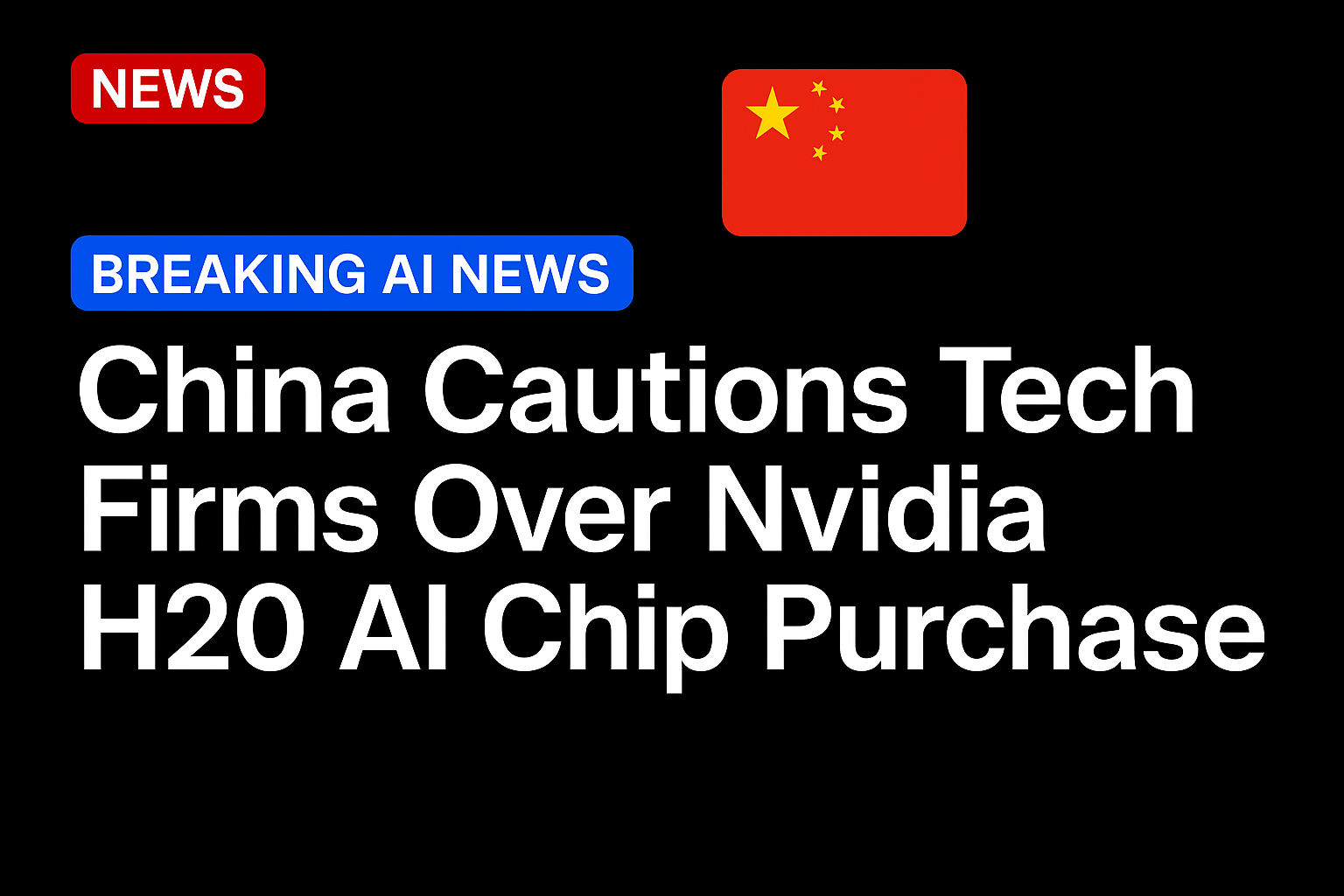Chinese authorities have summoned domestic companies including major internet firms Tencent (9888.HK), opens new tab and ByteDance over their purchases of Nvidia’s (NVDA.O), opens new tab H20 chips, asking them to explain their reasons and expressed concerns over information risks, three people familiar with the matter told Reuters.
The Cyberspace Administration of China (CAC) and other agencies also held meetings with Baidu (0700.HK), opens new tab and smaller Chinese tech firms in recent weeks, said one of the two people and a third source.
The Chinese officials asked companies why they needed to buy Nvidia chips when they could purchase from domestic suppliers, the sources.
Authorities also expressed concerns that materials Nvidia has asked companies to submit for U.S. government review could contain sensitive information including client data, one of the sources said.
However, the people, who declined to be identified because the meetings were not public, said the companies have not been ordered to stop buying H20 chips.
Nvidia said on Tuesday the H20 chip was “not a military product or for government infrastructure”.
“China has ample supply of domestic chips to meet its needs. It won’t and never has relied on American chips for government operations, just like the U.S. government would not rely on chips from China,” the statement said.
Baidu, ByteDance, Tencent and the CAC did not immediately respond to requests for comment.
Earlier on Tuesday, Bloomberg News reported that Chinese authorities have urged domestic companies to avoid using Nvidia’s H20 chips, particularly for government-related purposes.
Several companies were issued official notices discouraging the use of the H20, a less-advanced chip, mainly for any government or national security-related work by state enterprises or private companies, the report said, citing people familiar with the matter.
In a separate report, The Information reported that ByteDance, Alibaba and Tencent had been ordered by the CAC in the past two weeks to suspend Nvidia chip purchases altogether, citing data security concerns.
The CAC directive was communicated at a meeting the regulator held with over a dozen Chinese tech firms, shortly after the Trump administration reversed the export curbs on H20 chips, according to the Information report.
Reuters could not immediately confirm the reports and Alibaba did not respond to a request for comment. Top contract chipmaker SMIC (0981.HK), opens new tab rose 5% on Tuesday on expectations of rising demand for locally-produced chips.

But even without an outright ban, the concerns expressed by Chinese authorities could threaten Nvidia’s recently restored access to the Chinese market as Chinese companies look to keep in step with regulators.
Nvidia designed the H20 specifically for China after U.S. export restrictions on its more advanced AI chips took effect in late 2023. The H20 had since been the most sophisticated AI chip Nvidia was allowed to sell in China.
Earlier this year, U.S. authorities effectively banned its sale to China, but reversed the decision in July following an agreement between Nvidia and the Trump administration.
Last month, China’s cyberspace regulator summoned Nvidia representatives, asking the company to explain whether the H20 posed backdoor security risks that could affect Chinese user data and privacy.
State-controlled media have intensified criticism of Nvidia in recent days. Yuyuan Tantian, affiliated with state broadcaster CCTV, published an article on WeChat over the weekend claiming H20 chips pose security risks and lack technological advancement and environmental friendliness.
The scrutiny threatens a significant revenue stream for Nvidia, which generated $17 billion from China sales in its fiscal year ended January 26 – or 13% of total revenue.
China has accelerated work on domestic AI chip alternatives, with companies, such as Huawei (HWT.UL) developing processors that rival the H20’s performance, and Beijing urging the technology sector to become more self-sufficient.
However, U.S. sanctions on advanced chipmaking equipment, including lithography machines essential for chip production, have constrained domestic manufacturers’ ability to boost production.
On Monday, U.S. President Donald Trump suggested that he might allow Nvidia to sell a scaled-down version of its advanced Blackwell chip in China, despite deep-seated fears in Washington that Beijing could harness U.S. AI capabilities to supercharge its military.
China’s foreign ministry said on Tuesday it hoped the U.S. would act to maintain the stability and smooth operation of the global chip supply chain.
The Trump administration last week confirmed an unprecedented deal with Nvidia and AMD (AMD.O), opens new tab, which agreed to give the U.S. government 15% of revenue from sales of some advanced chips in China.
China’s renewed guidance on avoiding chips also affects AI accelerators from AMD, Bloomberg also reported. It was not clear, however, whether any notices from Chinese authorities specifically mentioned AMD’s MI308 chip.
AMD did not respond to a request for comment outside regular business hours.
Reporting by Reuters Staff and Ananya Palyekar and Surbhi Misra in Bengaluru; Additional reporting by Arsheeya Bajwa in Bengaluru; Editing by Saad Sayeed, Miyoung Kim, Kate Mayberry and Tomasz Janowski
Source: https://www.reuters.com/




